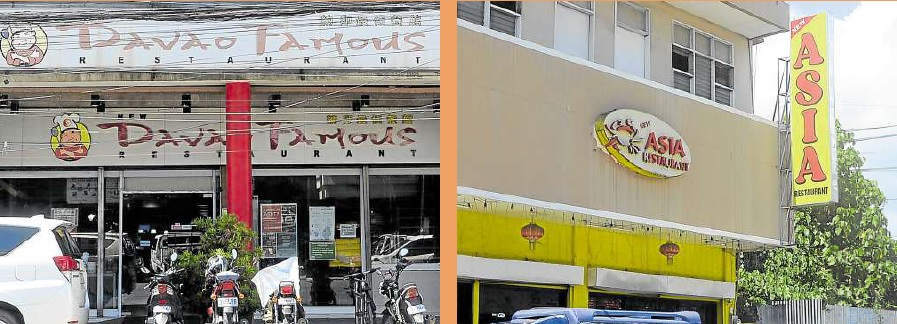
Davao Famous and New Asia restaurants are also local culinary icons in Davao City. —PHOTOS BY BING GONZALES
DAVAO CITY—If you have 48 hours to spend in Davao, the city known as the “Crown Jewel of Mindanao,” one can start the journey by visiting the local landmarks and then on to gastronomic destinations.
In the downtown area, at the heart of the city, the 4-hectare (ha) “People’s Park” features a Durian Dome and is home to more than 1,000 species of plants and trees.
From People’s Park, hop on to the newly opened P76-million Doña Vicente Park in Doña Vicente Village at Barangay 9-A, which features a 200-meter skywalk, a koi pond, an amphitheater and a library.
People’s Park is open from 6 a.m. to 8:30 a.m. while Doña Vicenta Park is open from 6 a.m. to 9 p.m. Entrance is free for both parks. To reach these parks, you can take a taxi from your hotel.
These are also accessible by public utility jeepneys, and the dropoff point is at the corner of Ponciano Reyes-Palma Gil streets for People’s Park and F. Torres Street for Doña Vicenta Park. Take the local jeepney’s Route 8 to Doña Vicenta Park. The minimum fare is P12.
Nature-tripping is easy in Mindanao’s premier city. At Davao Crocodile Park in Talomo, one could see how reptiles are propagated and taken care of as well as harvested for their exotic meat.
Up close with PH Eagle
An early visit to the Philippine Eagle Center is also advised for travelers who want to catch a glimpse of our national bird. The center is located in Malagos, Baguio District, about an hour’s drive from downtown Davao. The entrance fee is P150 for adults and P100 for kids.
After visiting the eagle center, just a few meters away is the Malagos Garden Resort, an agri-ecotourism facility that offers premium access to all park attractions, including the bird feeding dome. The weekday admission fee is P250 for adults and P200 for kids. The weekend fee (with the bird show at 10:30 a.m.) is P300 for adults and P150 for kids.
Philippine Eagle Center and Malagos Garden Resort can be reached via hired vehicle or private car, although these sites are also accessible by public transport. Passenger vans or buses set off from a terminal in Bankerohan to Calinan; van fare is P55. From Calinan, you can hire a tricycle at P30 per passenger but you can opt to hire the entire cab for P120 per trip.
If you want to go further south, visit the 80-ha Eden Nature Park and Resort at Barangay Eden, Toril District, which sits around 3,000 feet above sea level.
From Malagos or Toril, via hired car or private vehicle, get a closer look by passing through the 17.9-kilometer Davao Coastal Road, the first in the city.
Another park to explore is the GAP Farming Resort, a sprawling 10-ha mountain resort and orchard farm located in Green Meadows, Ma-a, about 30 minutes from downtown via taxi, depending on the traffic. The entrance fee is P100 for adults and P90 for kids.
GAP Farming Resort has been around since 1973; it has an Olympic-size swimming pool and a huge marble sign that says, “Land of Promise.”
Night market
During park visits, one can try a variety of food items at the Roxas Night Market on Roxas Street or at the Big Bang on San Pedro Street that is open from 6 p.m. to midnight.
If you are a foodie, you may try the Davaoeños’ all-time favorite Davao Dencia’s Restaurant, famous for their arroz caldo, lugaw, and tokwa’t baboy; or try a few known Chinese restaurants like Shanghai or Davao Famous along Ramon Magsaysay Street; New Asia Restaurant in Villa Abrille Street, all inside Davao’s Chinatown area; or Ahfat Seafoods Plaza inside the compound of NCCC Mall Victoria Plaza in Bajada. For authentic Chinese cuisine, they can try dining at SunMy Seafood Restaurant at Dacudao Avenue corner Vinzon Street.
For all-day breakfast, one must try TAPS, with branches on Duterte and Bolton Streets and in Matina Town Square. TAPS is famous for their “silog” (fried rice with egg) meals. Another all-time favorite dining area is the Goldie Chicken Haus on Ilustre Street, easily accessible by jeepney or taxi.
For a heritage feel, one can try dining at Tola, Kan-anan sa Balay Oboza. The Oboza Heritage House was built in 1929 and is in the middle of the city. A few meters away from Oboza is another historical landmark, the San Pedro Cathedral, its original structure built in 1847. Adjacent to the church is the City Hall of Davao.
You can have lunch at Luz Kinilaw on Salmonan Boulevard or Yellowfin along Quimpo Boulevard, both offering fresh tuna and seafood. Home-cooked meals are also famous inside the public market; visitors can try Marilyn’s or Paz Eatery.
If one is into kakanin and other Filipino delicacies, make a quick stop at Agdao Public Market or Bankerohan Public Market where different stalls offer the famous “sikwate” and “putomaya.”
The famous sikwate and puto maya of Del Mar Painitan in Bankerohan Public Market. —PHOTOS BY JOSELLE R. BADILLA
Coffee, ‘pasalubong’
Davao, to date, has more than 50 coffee shops. You can try one, a minimalist-designed coffee shop named Fourth Street Cafe, with branches on Narra and Malvar Streets. Fourth Street is a local specialty coffee shop that offers a wide array of espresso-based and non-coffee-based drinks.
Davao is also known for its wide array of fruits. Popular pasalubong from the city are pomelo, durian, mangosteen, marang and lanzones. These can be bought cheaper at Bankerohan public market but even cheaper in fruit stalls along the Malagos Highway.
For other pasalubong (gift) items from Davao and crafts and textiles from Mindanao, they can visit Poblacion Market Central along C. Bangoy Street where vendors from the once famous Aldevinco Center had relocated.